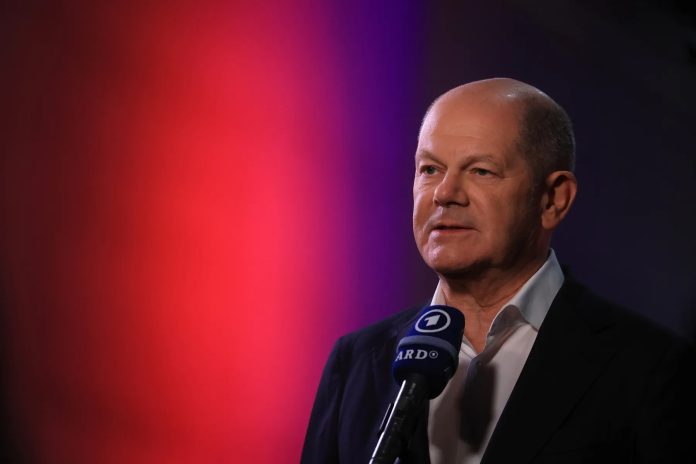The race to lead Germany is diverting through Switzerland, with a campaigning push in Davos set to showcase competing visions for how to revive Europe’s biggest economy.
Both Social Democrat Chancellor Olaf Scholz and his rival, the Christian Democrat frontrunner Friedrich Merz, will seek the blessing of the global business elite within hours of each other at the mountain resort gathering of the World Economic Forum on Tuesday.
The battle of ideas that will play out there is one of the most crucial this year for Germany and the region as a whole. Merz is likely to tout his plan for corporate tax cuts, in stark contrast to the debt-fueled investment push that Scholz is arguing for.
Their time-consuming pilgrimages to woo global executives mingling in the Swiss Alps highlight how central prospects for the struggling economy have become before the Feb. 23 election.
Just last year, former Finance Minister Christian Lindner was defiant in Davos, insisting Germany wasn’t Europe’s sick man but just “tired” and in need of coffee. Now, with persisting evidence that the region’s economic motor is stuck in first gear, and vulnerable to US tariffs from President Donald Trump, any pretense of business as usual is over.
German data just last week showed a second consecutive year of contraction in 2024, underscoring that point. A prolonged downturn in Chinese demand, an energy crisis, an ailing auto sector succumbing to job cuts, and the stalling of Scholz’s push to build up a semiconductor industry instead has left officials in Berlin reeling.
Europe as a whole has been struggling with competitiveness, investment and defense. Political turmoil in Germany and France has also robbed the bloc of a prominent national leader who is respected by peers and can shape the region’s agenda as Scholz’s predecessor Angela Merkel once did.
“It’s for the German people to decide, but clearly the policy makeup of the previous administration needs to change,” BlackRock Inc. Vice Chairman Philipp Hildebrand told Francine Lacqua on Bloomberg Television in Davos. “Change will be a positive, and then we’ll see whether that change could be translated into European leadership.”
Merz, whose traditionally pro-business CDU/CSU bloc has a double-digit lead over Scholz’s center-left SPD in surveys, could get the warmest welcome, even if his own appearance at 6 p.m. local time isn’t on the forum’s main stage.
He is likely to use the opportunity to comment on Trump’s first day in office. The CDU leader, who was supervisory board chairman at Blackrock‘s German unit, has already expressed has already expressed a decidedly more optimistic view of the new US president than the majority of Germans, calling him a “very predictable leader” with a clear agenda.
Merz’s policy platform to kick start the economy — entitled “Agenda 2030” to echo former Chancellor Gerhard Schroeder’s growth reforms earlier this century — includes a higher threshold for income tax and a lower levy for companies.
Scholz slammed that position this month, saying that ordinary people will have to foot the bill by suffering cuts to public pensions and care.
Like Lindner, the chancellor has previously put on a brave face in Davos. As he turned up in 2023, he casually insisted the country would avoid a recession. The economy barely did so and ultimately ended that year with lower gross domestic product.





